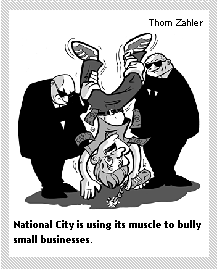Reprinted from Cleveland Scene with their permission
In early 2004, two businessmen from New Jersey flew to Cincinnati to make a sales presentation to the equipment arm of Cleveland-based National City Bank. It was an internet phone system called the "matrix box," and it was revolutionizing phone service for thousands of small businesses. Their company, NorVergence, wanted the bank to buy the boxes, then lease them to NorVergence customers, in much the same way as National City would finance a farmer's backhoe. Ralph Martinez, the chief operations officer for the bank's subsidiary, liked what he saw. National City started buying leases by the hundreds, accumulating $10 million worth in a matter of months. Then the bottom dropped out. In June 2004, a cash-starved NorVergence stopped paying its phone bill. In response, the phone company cut off service to thousands of matrix-box customers. Soon after, NorVergence's creditors pushed it into receivership. As the dust settled, what seemed like an honest venture began to look more like a scam. The Federal Trade Commission sued NorVergence, claiming that the company had created phony leases. A U.S. District Court judge ordered a $181.7 million judgment against the company. And the bankruptcy trustee filed complaints against the wife and son of NorVergence founder Tom Salzano, accusing them of siphoning hundreds of thousands of dollars in company funds for vacations, a luxury home, and expensive clothes. (A lawyer for Tom Salzano ignored repeated calls from Scene .) NorVergence customers were left owing tens of thousands of dollars in lease payments for the matrix box, which -- without phone service -- would be worthless. National City, however, isn't concerned about details. The fine print says that the leases are still good. So the bank is suing the small businesses to make them pay up. Take the Scribner Insurance Agency in Denton, Texas. In May 2004, Ken Scribner, who runs the business with his father, signed up to receive three years of phone service at $600 a month. Two months later, he still wasn't able to make calls. So he was surprised when he began hearing from National City's debt collectors. "They'd call every day at lunch," says Scribner. "They wanted us to start paying them for something we never even got." Scribner thought he was signing a normal service agreement, the equivalent of a plan for a really expensive cell phone. But the devil was in the fine print: According to his contract, Scribner was paying not for the phone service, but for the lease on the matrix box. "The lease says that they're paying on the equipment," says Bob Schroeder, of the Federal Trade Commission. "The consumer's obligation to pay isn't contingent upon getting services." It was an ingenious scam. NorVergence turned around and sold the leases to banks like National City. By the time customers stopped paying on the deceptive contracts, NorVergence officers had taken the money and run. Now the Scribners, along with hundreds of other small-business owners across the country, are being sued by National City for the full amount owed on the lease. Texas Attorney General Greg Abbott sent National City a letter in October 2004, warning the company to back off victims like the Scribners. "We have reason to believe that these agreements are based on fraud and should be voided," reads the letter. (A spokesman for National City declined to comment.) The threats are being taken seriously. Florida Attorney General Charlie Crist sued National City and 11 other leasing companies in 2004, alleging unfair and deceptive trade practices for trying to enforce the bogus contracts. Several other states have threatened similar action. Many other lenders have torn up the bogus contracts or settled for pennies on the dollar. But National City is playing hardball. "They're just a nasty little company," says Dallas attorney Scott Mackenzie, who represents the Scribners. "They'll take paper from anyone, and it's disgusting. You'd think if they're going to be throwing money out the door, they ought to have some idea who they're dealing with." But because the Federal Reserve keeps baiting an economic boom with low interest rates, big banks like National City have moved into financing smaller-ticket items. And the new economics makes for strange and often shady bedfellows. Prior to starting NorVergence, Tom Salzano was infamous for receiving the biggest Federal Communications Commission fine in history for "slamming" -- the illegal practice of changing a customer's long-distance carrier without permission. The source of the problem has to do with the big banks' focus on volume, says Steve Reid, of Pacific Capital Bank in California, which turned down numerous offers to buy NorVergence leases. "The manager gets promoted, and by the time the shit hits the fan, he's already in a different department." Everything about NorVergence sent up red flags, Reid says. "They were going to control everything . . . As soon as they described it, I knew we weren't doing anything." Now customers are left holding the bag. If the Scribners lose their case against the bank, they'll be forced to take out a loan to pay for a service they never received. They can't believe that a reputable bank like National City would try to enforce the fraudulent service contracts. "Are you gonna pay a bill for something you never got?" Scribner asks. "Get it hooked up, and we'll pay it."
|
||
 |
||

